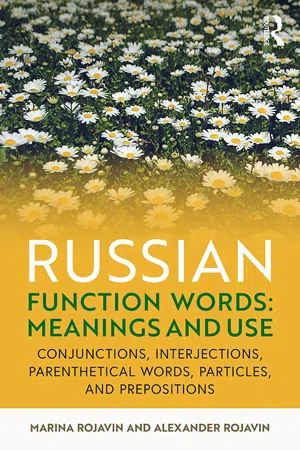![]()
Entries
А Conjunction. Particle. Interjection
Conjunction
And, but, while
Connects parts of sentences or clauses when listing facts to swing to a different object of narration or speech.
| Обы́чно на зáвтрак он пьёт кóфе, а на обéд сок. | Usually, he drinks coffee for breakfast and juice for dinner. |
| Ты посмотри́ фильм, а пáпа покá суп свáрит. | Watch a movie, while dad prepares the soup. |
But
Expresses disparity. Has an adversative meaning when there is a lack of correspondence between parts of a sentence. The conjunction но but could be used in these sentences to convey negative emotion and to show the irregularity of the facts’ sequence. (See also но.)
| Нáшему сосéду ужé за сéмьдесят, а он всё ещё рабóтает. | Our neighbor is already 70, but he still goes to work. |
| Ужé дéвять часóв, а дед всё ещё смóтрит телеви́зор. | It’s already nine, but grandpa is still watching TV. |
But
When following the particle не not, it is used to oppose actions, objects, features, or phenomena, implying that there is something unexpected in one of the parts or clauses of a sentence. (See also не.)
| Онá закóнчит университéт не в э́том годý, а в бýдущем. | She’ll graduate from her university not this year, but the next. |
| Не прошлó и чáса, а мнóгие зри́тели ужé ушли́ из кинозáла. | An hour hadn’t passed yet, but a lot of people had already left the movie theater. |
But
Connects parts or clauses that have words denoting time, when one action follows after another. If a speaker has a negative attitude towards the information, но but would be used here. (See also но.)
| Сначáла мы éхали пóездом, а потóм пришлóсь добирáться на такси́. | At first we took a train, but then we had to use a taxi. |
And
Intensifies the focus on the topic being discussed in combination with words like крóме тогó besides, ещё in addition, etc. The stylistically neutral conjunction и and can also be used when a speaker does not express any feelings towards the information. When the utterance implies a negative overtone, the conjunction но but can be used. (See also и, но.)
| И́нна рабóтает в кафé‚ а крóме тогó‚ в библиотéке. | Inna works in a cafe and also in the library. |
Though
In combination with particles like всё-таки still, this conjunction serves as a link between speech acts and also conveys a speaker’s attitude towards the foretold, intensifying the particle. It signals a protest towards the previous speech act. The neutral conjunction и and or the opposing conjunction но but can also be used. (See also и, но.)
| А всё-таки лéто бы́ло замечáтельным, что бы кто ни говори́л. | The summer was wonderful, though, regardless of what anyone says. |
Particle [coll.]
Hey!
Used when repeating an address to get someone’s attention. The comma is not used after the particle.
| Кóля! А Кóля!? Порá домóй. | Kolia! Hey Kolia! It’s time to go home. |
Yeah, okay
Used as an exclamatory interrogative or interrogative reply or at the end of sentences that require a reply.
| Свéта! – А?! – Ты когдá ухóдишь? Пойдём сегóдня в кинó пóсле обéда‚ а? | “Sveta!” “Yeah?” “When are you leaving? Let’s go to the movies today after dinner, okay?” |
Interjection
Ah
Used as an exclamation to express positive or negative emotions when someone meets someone else or is talking on the phone. Also used as a response to confirm one’s understanding of something. Separated by a comma.
| А‚ Алексáндр Геóргиевич! Так э́то Вы звони́ли. | Ah, Aleksandr Georgievich! So it was you who called. |
| А-а‚ давнó я не ви́дела Вас! | Ah, I haven’t seen you in a long time! |
| Ты так пóздно... |
